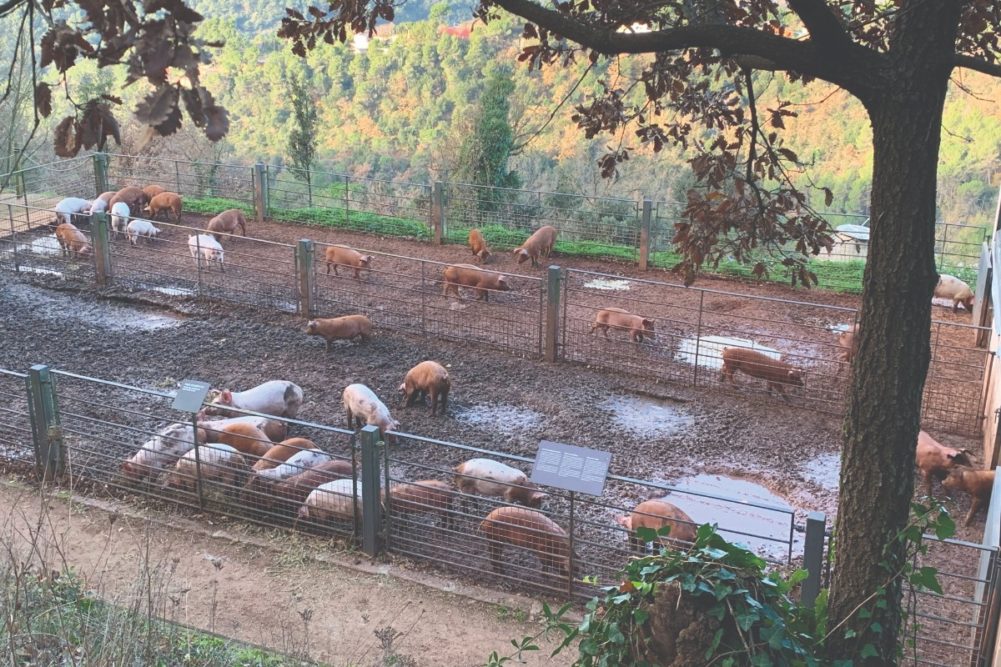BARCELONA, Spain — The Salgot family has been in the sausage business since Antoni Salgot started a small sausage factory in 1928 in the main square of Aiguafreda, in the province of Barcelona, Catalonia, Spain. Back then, four employees handmade the sausage, and the product was delivered by train to Barcelona for sale and distribution. The family business evolved and grew through the years, as Pere Salgot, Antoni’s son, took over the business in 1964. Today, the third-generation brother-and-sister team of Valeri and Dolors Salgot are involved in the family operation.
Salgot’s cured, cooked and fresh sausage are all made with local ingredients using traditional Catalán recipes and processed in the company’s facilities in the towns of Seva and Aiguafreda. Over the past few years, the company has added a number of organic products produced from hogs raised at its new organic research farm.
Nestled at the foot of the Montseny Natural Park, 30 miles north of Barcelona, is the Ecogranja de Recerca Salgot (the Salgot Organic Research Farm), a small, organic hog farm just 1.25 acres in size. Not a large operation by any means – just 130 hogs on site during breeding – however, the Salgot farm has provided the company with the opportunity to enter the growing organic pork market.
According to the company, its latest venture “gives us a leading edge in being able to satisfy an ever-more demanding clientele with regard to product quality and production processes.”
MEAT+POULTRY had the opportunity to tour the Salgot Organic Research Farm in December alongside 12 other international meat industry journalists as a part of the Alimentaria International Press Conference, which was held for 50 international journalists in an effort to promote the 2020 Alimentaria trade show in Barcelona.
Sustainabile sourcing
Built at the site of an old, reforested quarry, the organic research farm was designed with sustainability in mind. Sustainability, both in the use of energy and waste management, is a high priority. The farm houses a small plant for the biological treatment, purification and composting of manure.
Solar thermal and photovoltaic panels on the buildings provide most of the hot water and electricity used at the farm. The rest of the energy is supplied by a biomass boiler which runs on sustainably sourced wood pellets. The farm also reuses rainwater and grey water for cleaning and irrigation, another environmentally sustainable practice.
During design and engineering phases of constructing the farm, it was determined that the buildings that would house the pigs should face south in order to provide the animals with direct sunlight, both for warmth and comfort. The farm includes specially designed buildings to house the pregnant sows, unweaned and weaned piglets, as well as an infirmary for any sick animals that are removed from the group (as an organic operation, animals that need antibiotics are no longer kept with the rest of the litter). The animals also enjoy large indoor and outdoor areas during the eight to nine months they spend at the farm.
The pigs are fed a diet of organic feed made up of Mediterranean ingredients such as barley, wheat, peas and olive oil. The straw and fodder used in the pens is also organically grown on-site. The feed composition, which is one of the areas of research at the farm, is constantly being reevaluated.
In addition to feed research, the farm also studies genetics. The ongoing genetics research is providing Salgot with the tools it needs to help select the breed of pigs that best adapt to the breeding conditions at the farm with a long-range goal of producing the best quality meat possible, according to the company. For now, the farm raises Duroc-Landrace pigs that are 75 percent Duroc and 25 percent Landrace.
After eight to nine months of growing at the Salgot Organic Research Farm, the pigs are sent to slaughter at a facility in Avinyó, 15 miles from the farm.
The organic products are produced at one of the company’s two processing facilities, nine miles from the farm. Because of limited supply of the raw material, the Salgot organic (ecológico) sausages are produced in a limited supply. The rest of the Salgot products are made from pork raised at other area livestock farms not owned and operated by the Salgot family.
The organic product line includes a variety of Spanish and Catalán cured and cooked sausages such as fuet, secallona, salchichón de Vic, botifarra negra, botifarra de huevo, botifarra blanca and botifarra catalana.
The company’s non-organic product line also includes fresh sausage, pork cracklings, snack-size cured sausages and the well-known, certified, regional favorite Llonganissa de Vic sausage.
Opening doors
When the Salgot family decided to build its organic farm in 2010, they made immediate plans to open its doors to the public once the farm became operational. “Making the farm open to the public was important to us so we could help visitors understand how an organic farm is run, what regulations we operate under and see, firsthand, the living conditions of the animals,” Dolors Salgot explains.
“This new project expresses our company’s commitment to the environment, to society and to the well-being of our animals,” Valeri Salgot says. “This has been made possible thanks to the cooperation of the agriculture and livestock institutions in Catalonia, Spain and Europe.”
School groups and families can arrange tours to visit the research farm. The tours include a video presentation, tour of the facility including the livestock buildings and a product tasting at the finish. Having an open-door livestock farm is unique to the area, according to Dolors Salgot.
“We believe it’s important for people to see the day-to-day workings of our business,” Valeri says.


